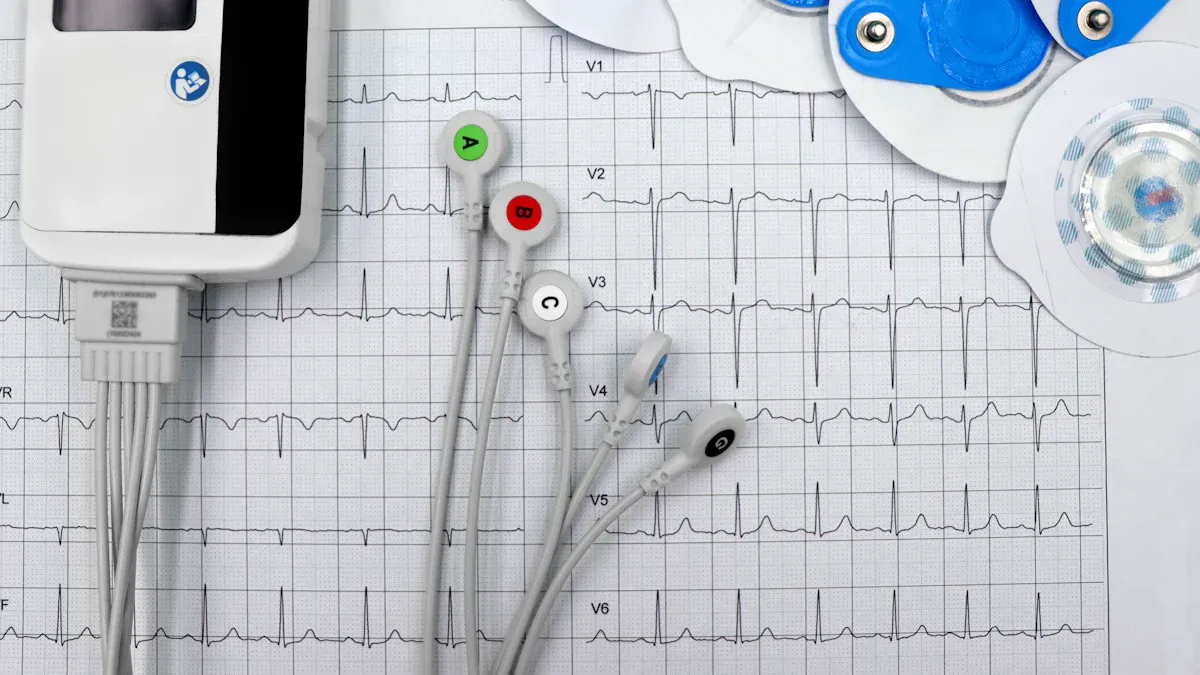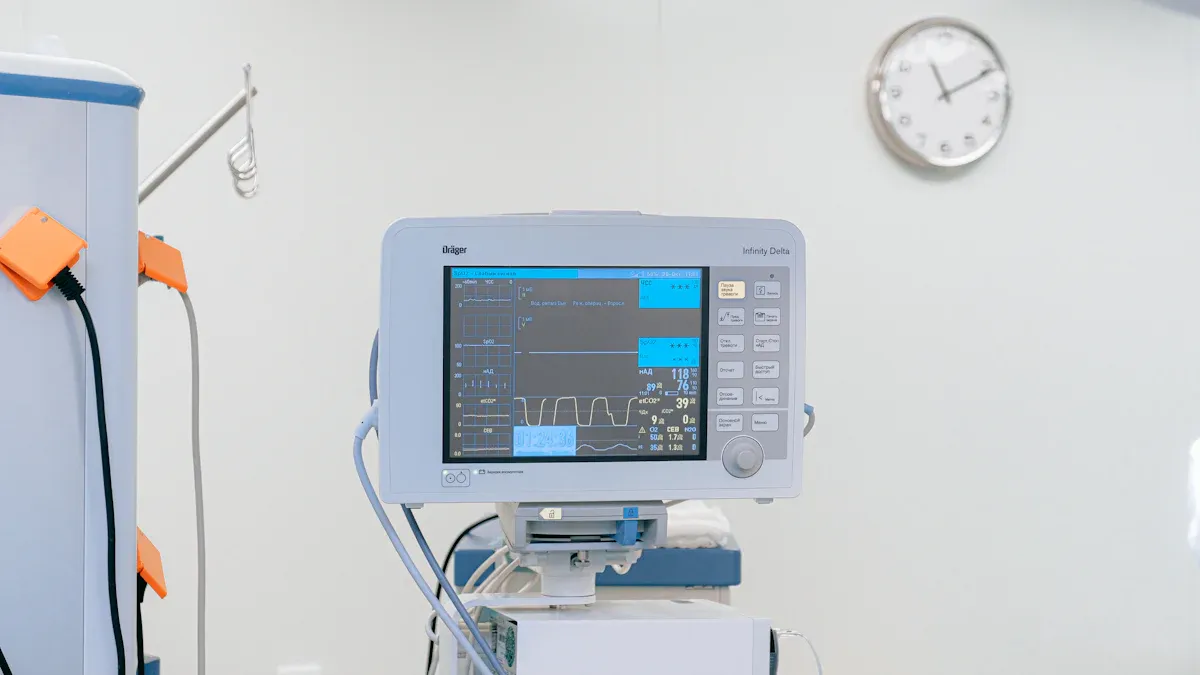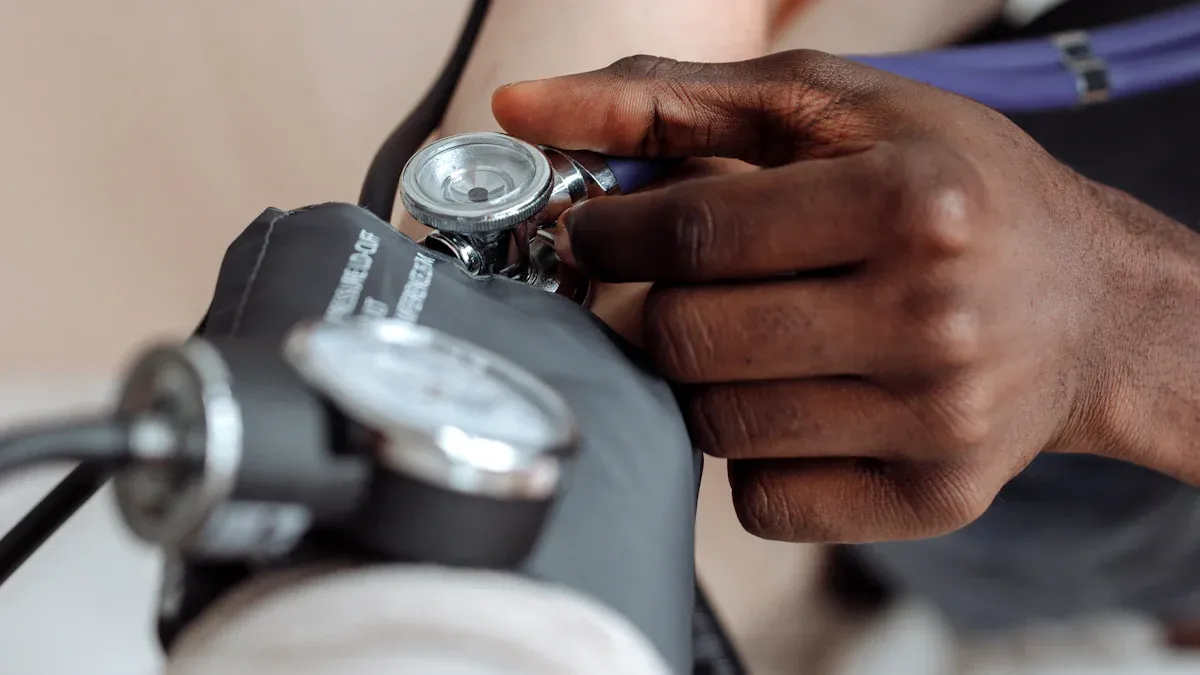Choosing Nitinol Tubing for Cardiovascular Devices: Key Factors to Consider

Customizable Nitinol Tubing for Cardiovascular Devices is crucial for heart-related medical tools. It boasts unique features such as flexibility and the ability to retain its shape, making it ideal for intricate medical applications. For instance:
Innovative techniques like TM-1 enhance the durability of Nitinol, allowing it to last 2-3 times longer, even after 10 million uses.
Precise dimensions, with tolerances as tight as ±0.005mm for tubes over 0.80mm wide, ensure a perfect fit for medical instruments.
These characteristics highlight the importance of selecting the right Customizable Nitinol Tubing for Cardiovascular Devices to ensure optimal performance and patient safety.
Key Takeaways
Nitinol tubing is important for heart devices because it bends easily and remembers its shape, making devices work better and safer for patients.
Always pick good materials and follow safety rules like ASTM F2063 to make sure medical tools are safe and work well.
Changing Nitinol tubing to fit specific needs is important. It helps create designs that work better for medical use.
Pick trusted suppliers with good reviews and proper certifications to ensure the tubing is safe and high-quality.
Think about the total cost of Nitinol tubing, including how long it lasts and how well it works, not just the starting price, to save money later.
Importance of Nitinol Tubing in Medical Devices

Unique properties of Nitinol
Nitinol is a mix of nickel and titanium with special traits. It can return to its original shape after being bent when heated. This makes it perfect for medical tools needing accuracy and flexibility. It can also handle a lot of stress and bounce back without breaking. Unlike other materials, Nitinol can bend 10 to 30 times more without damage, making it very dependable.
Nitinol's unique abilities come from a quick change between two structures, austenite and martensite. This change happens fast, helping it adjust to heat or pressure. It is also safe for the body, causing little reaction and helping tissues heal faster. These qualities make Nitinol a key material in modern medical tools.
Applications in medical device tubing
Nitinol tubing is used in many medical tools because it is strong and flexible. It works well for small surgeries. For example, it is used in catheters, stents, and guidewires. These tools can move through tricky body paths while staying strong. Nitinol is also safe for the body, so these tools work well without causing harm.
In heart surgeries, Nitinol tubing is very important. Stents made from it adjust to blood vessel movements, lowering risks and helping patients heal better. Catheters made with Nitinol give doctors great control during delicate surgeries. These uses show why Nitinol tubing is so valuable in medical tools.
Role in cardiovascular devices
Nitinol tubing is especially important for heart-related devices. Tools like stents and closure systems depend on its special features. For example, the WATCHMAN FLX™ device by Boston Scientific uses Nitinol tubing for precise placement during heart surgeries. This lowers risks and ensures accuracy.
Nitinol's ability to remember shapes and stretch easily helps heart devices move with the body. This lowers the chance of injury and helps patients recover faster. Research shows Nitinol devices cause fewer problems than those made from other materials. Its strength also means these tools last longer, making them a trusted choice for saving lives.
Factors to Consider for Customizable Nitinol Tubing

Material quality and biocompatibility
Good material and safety are key for nitinol tubing. Strong nitinol works well under pressure and keeps its special traits. These include bending easily and returning to its shape. Cardiovascular tools need these features to handle body movement and stress.
Safety with human tissues is also very important. Nitinol must not cause bad reactions in the body. Safe materials lower risks like swelling or rejection, helping patients heal faster. Smooth surfaces on nitinol tubing make it safer and better for medical use. Special designs also make it stronger and last longer for heart implants.
Customization options
Making nitinol tubing fit specific needs is very helpful. Custom designs let you choose the size, flexibility, and strength. Companies like EUROFLEX and Confluent Medical Technologies make tubing just for your needs. They work with you to create better tubing for medical tools.
New ways to make nitinol tubing have made it stronger. For example, treated nitinol lasts 30% longer than regular types. This is great for heart tools that face repeated stress. Custom designs ensure tubing fits perfectly and works longer for medical devices.
Regulatory compliance
Rules and certifications are important for nitinol tubing. They make sure the tubing is safe and works well. Heart tools must follow rules like ASTM F2633-07 for safety.
Always ask suppliers for proof they follow these rules. Certifications show they check for quality and avoid problems. Trusted suppliers are more likely to give you safe and strong tubing for your devices.
Supplier reliability
When picking nitinol tubing, check if the supplier is reliable. A trustworthy supplier gives good quality and delivers on time. This is very important for medical tools because delays or bad products can risk lives.
Good suppliers test their nitinol tubing carefully to ensure quality. These tests include:
Checking the material to meet required standards.
Testing how well the tubing handles pressure.
Running durability tests to find weak points over time.
Also, see if the supplier offers technical help. A helpful supplier can guide you on choosing materials, customizing tubing, and following safety rules. This support helps your devices work well and stay safe.
Look at the supplier's history too. Read reviews and feedback from other buyers. A supplier with a good reputation and happy customers is more likely to meet your needs. By choosing a reliable supplier with strong support, your heart devices will work better and safer.
Cost-effectiveness
Saving money is important when buying nitinol tubing. But don’t just pick the cheapest option. High-quality tubing may cost more but prevents problems like device failures or recalls.
To save money, balance quality and price. Find suppliers who make tubing that fits your exact needs. Custom tubing reduces waste and extra costs.
Check the supplier’s production methods too. Advanced factories can make strong tubing at fair prices. Some suppliers use special treatments to make tubing last longer, giving you more value for your money.
Think about the total cost, not just the price tag. This includes how long the tubing lasts, how well it works, and any upkeep costs. Picking cost-effective tubing keeps your devices safe and within budget.
Evaluating Suppliers for Nitinol Tubing
Certifications and compliance
When picking a nitinol tubing supplier, certifications are very important. These prove the tubing is safe and meets strict rules for medical use. For example, ISO 13485 shows the supplier uses quality practices for medical devices.
Always ask suppliers to show proof they follow industry rules. This includes certifications like ASTM F2633-07, which checks the safety and strength of nitinol tubing. A certified supplier shows they care about making high-quality products. Choosing certified suppliers helps ensure your medical tools are safe and work well in heart devices.
Testing product samples
Before choosing a supplier, test their nitinol tubing samples. Testing shows if the tubing is strong, flexible, and safe for the body. Good suppliers often give samples to check how their tubing works in real situations.
During testing, look at key things like strength and accuracy. See if the tubing keeps its shape after being bent or if it matches the size you need. Testing also helps find weak spots early, saving you from problems later. By testing samples, you can pick a supplier that makes reliable tubing.
Manufacturing capabilities
A supplier’s ability to make tubing affects its quality and quantity. Advanced methods help create tubing that works well in tough medical jobs. For example, AccuPath uses special techniques to make strong and precise nitinol tubing for heart devices.
Scalability is also important. Suppliers using wire drawing methods can make lots of tubing without losing quality. This ensures your medical tools stay reliable, even with higher production needs.
Here’s a simple table of key manufacturing abilities:
Evidence Type | Description |
|---|---|
Advanced Manufacturing | AccuPath uses top methods to improve tubing performance. |
Scalability | Wire drawing methods allow more tubing without losing quality. |
Regulatory Compliance | ISO 13485 ensures the tubing meets safety and quality rules. |
Also, check suppliers like Hamilton Company, Vita Needle Company, and RMV Metals Group. They are known for making great nitinol tubing. Picking a supplier with strong manufacturing skills ensures your medical tools are top quality and dependable.
Reputation and customer feedback
When picking a supplier for nitinol tubing, check their reputation. A supplier's history shows how good their products and services are. Positive reviews from other medical companies can help you trust your choice.
Start by learning about the supplier's background. See how long they’ve been making nitinol tubing. Experienced suppliers often know how to make high-quality tubing. They also improve their methods to meet strict medical needs.
Look at customer reviews too. Reviews show if the supplier delivers on time, handles special requests, and fixes problems. For example, if many customers say the tubing is strong and arrives on time, that’s a good sign. But if reviews mention delays or bad quality, be cautious.
Tip: Use review websites or ask the supplier for references. Talking to past customers can give you helpful details about their work.
You can also check if the supplier has won awards. Awards mean experts trust their nitinol tubing quality. This can make you feel more confident in their reliability.
Lastly, see if the supplier communicates well. A good supplier answers questions and listens to concerns. Clear communication shows they care about quality and keeping customers happy.
By checking a supplier’s reputation and reviews, you can choose wisely. This helps ensure the nitinol tubing you get works well for your heart devices.
Mistakes to Avoid When Choosing Nitinol Tubing
Ignoring compliance requirements
Following rules is very important when picking nitinol tubing. These rules make sure the tubing is safe and works well in medical tools. Ignoring them can cause big problems like broken devices or recalls. For example, ASTM F2063 gives clear steps to keep nitinol strong and reliable. Without following these rules, the tubing might not work right, putting patients in danger.
Always check if your supplier follows these rules. Ask for papers that prove they meet the standards. This helps ensure the nitinol tubing is safe and dependable. By focusing on these rules, you can avoid problems and make sure your tools work properly.
Prioritizing cost over quality
Picking cheap nitinol tubing might seem like a good idea, but it can cost more later. Weak tubing can break, causing tools to fail or get recalled. Rules like ASTM F2063 are needed to keep nitinol safe and steady. Suppliers who skip quality checks may not follow these rules, leading to more risks.
Problem | What Happens |
|---|---|
Not following ASTM F2063 | Devices might break, get recalled, or harm patients. |
Bad material quality | Higher chances of breaking, rusting, or shorter device life. |
Buying strong nitinol tubing lowers these risks. It keeps your tools safe and working well, saving time and money. Always think about both cost and quality to get the best results for heart tools.
Overlooking supplier reliability
A good supplier is very important for making safe medical tools. Ignoring this can cause delays, bad quality, or broken products. For example, nitinol tubing with tiny flaws can crack under stress. These cracks often start from small surface problems, making the tool weaker. Clean and pure nitinol lowers this risk, especially for heart tools like valves.
Check the supplier’s history before choosing them. Look for reviews, certifications, and proof they make good products. Reliable suppliers test their nitinol tubing to meet safety rules. Picking a trusted supplier helps you avoid mistakes and keeps your tools working well.
Neglecting customization needs
Skipping customization for Nitinol tubing can cause big problems. Heart tools often need exact designs to work well. Without customization, the tubing might not fit your device’s needs.
Customizable Nitinol tubing lets you adjust size, thickness, and flexibility. These features help the tubing work better with your device. For example, a stent without enough flexibility might not move with blood vessels. This could lead to issues or device failure.
Tip: Share your design needs with the supplier. Clear details help them make tubing that fits your device perfectly.
Problems from ignoring customization include:
Bad fit: Tubing that’s the wrong size may not work right.
Weak durability: Regular tubing might break after repeated use in heart tools.
Higher risks: Tubing without proper flexibility can harm nearby tissues.
Buying ready-made tubing may seem easier but costs more later. Custom tubing avoids fixes and works better from the start. Working with suppliers who offer advanced options saves time and improves safety.
Note: Customization is essential for safe and effective heart tools. Always make it a priority when picking Nitinol tubing.
Practical Tips for Selecting Nitinol Tubing
Focus on quality and compliance
Choosing high-quality nitinol tubing is very important. Good tubing keeps its special traits like shape memory and flexibility under stress. Always check if the tubing follows rules like ASTM F2063 or ISO 13485. These rules prove the material is safe and strong for medical use.
Before cutting nitinol wire, learn about its unique traits. Its shape memory and flexibility can make cutting tricky. Use tools made for tough materials, like carbide or diamond-coated tools, for clean cuts.
Testing samples is another way to check quality. Bend or stretch the tubing to see if it keeps its shape. This helps you avoid weak materials that might fail. By focusing on quality and safety rules, you lower risks and protect patients.
Build long-term supplier relationships
Working closely with your nitinol tubing supplier helps your projects succeed. Reliable suppliers give good quality, deliver on time, and offer support. A strong partnership also helps with custom designs and solving problems fast.
Product Quality: Make sure the supplier meets your needs with certified materials.
Lead Times: Check if they can deliver on time for your projects.
Customer Support: A helpful team can answer questions and fix issues.
Price: Look at cost along with quality, delivery, and support.
Talk often with your supplier to build trust. This teamwork helps you make better tools and adjust to future needs.
Plan for future scalability
Planning ahead ensures your nitinol tubing supply grows with your business. As demand rises, your supplier must handle bigger orders without losing quality. Pick suppliers with advanced factories and scalable methods.
Share your future plans with the supplier early. This helps them prepare for larger orders or new designs. Scalable solutions save time and avoid delays, keeping your projects on track. Planning ahead keeps your devices competitive and ready for market needs.
Get help from experts
Choosing Nitinol tubing for heart devices can be tricky. Talking to experts can save time and avoid mistakes. These professionals know a lot about Nitinol and how it works in medical tools. Their advice helps you make better choices for safer and stronger devices.
Why expert help is important
Experts have years of experience. They know how to check tubing quality, follow safety rules, and suggest custom options. Their help stops you from picking tubing that doesn’t fit your needs or missing important safety steps.
Tip: Contact engineers, material experts, or medical consultants who work with Nitinol. They can guide you through tough problems and safety rules.
Finding the right experts
To find good experts, do some research. Look for people or companies with a strong history in medical tools. Check their skills, certifications, and past work. You can also ask tubing suppliers for expert recommendations.
Here’s a simple checklist to find trusted experts:
Experience: Choose experts with at least five years working with Nitinol.
Certifications: Make sure they know rules like ASTM F2063 and ISO 13485.
References: Ask for reviews or examples of their past work.
Why expert advice helps
Experts make sure your tubing is safe and high-quality. They also help you customize tubing, save money, and plan for future needs. By asking for their advice, you can feel confident in your choices and improve your heart devices.
Note: Getting expert advice early can stop costly fixes or rule-breaking later.
Picking nitinol tubing for heart tools helps them work better. Good nitinol bends easily and lasts a long time. This makes it great for medical devices. Choose tubing that is safe for the body and strong. Suppliers who follow safety rules and offer custom designs are helpful. They can make tubing fit your needs. Smart choices improve how tools work and help patients heal faster.
FAQ
Why is Nitinol tubing good for heart devices?
Nitinol tubing can bend and return to its shape. It moves easily with the heart and blood vessels. It is safe for the body and lasts a long time. These traits make it great for medical tools.
How do you check if Nitinol tubing follows safety rules?
Ask your supplier for proof of safety certifications like ASTM F2063. These show the tubing is safe and strong. You can also test samples to make sure it meets medical rules.
Can Nitinol tubing be made to fit special medical needs?
Yes, Nitinol tubing can be changed to match your needs. You can pick the size, strength, and flexibility. Custom tubing works better and helps patients heal faster.
How do you check if Nitinol tubing is good quality?
Test samples by bending or heating them to see if they keep their shape. Check the size and strength to make sure they fit your needs. Testing finds weak spots and ensures the tubing works well.
What should you look for in a Nitinol tubing supplier?
Pick suppliers with safety certifications and good reviews. Reliable suppliers deliver on time and offer help with designs. Working with trusted suppliers ensures safe and strong tubing for your tools.
See Also
Choosing The Right Nitinol Tubing Supplier For Your Requirements
Investigating Nitinol Tubing Uses In Medical Equipment
The Importance Of Nitinol Tubing In Modern Medical Uses
A Comprehensive Guide To Selecting Nitinol Tubing Correctly
Nitinol Tubing's Contribution To Progressing Medical Innovations

